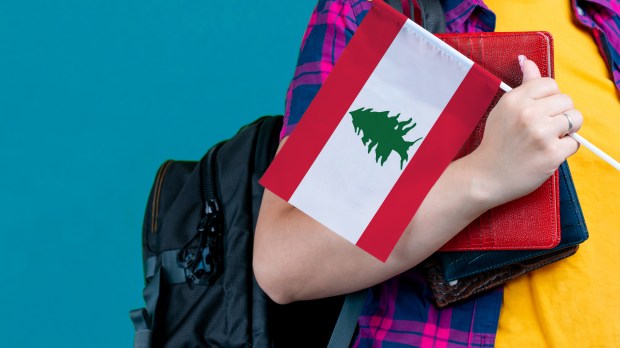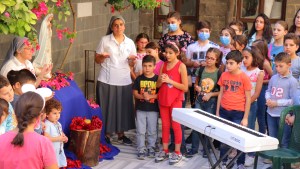Without education, a people has no future. And without Christian education in Lebanon, the future of Christianity in the Middle East – and the Middle East itself – is in peril.
So said a panel of experts from Lebanon who spoke during an online conference hosted by Aid to the Church in Need. The pontifical foundation that supports the faithful wherever they are persecuted, oppressed, or in need has been assisting education initiatives in Lebanon, which is undergoing a political and economic crisis.
Much of the world is unaware of the crises Lebanon has been struggling with in recent years. The mishandling of foreign investments has led to an extreme devaluation in the currency. Poverty has skyrocketed. And people can’t even access their own bank accounts.
While Lebanon’s model of interreligious cooperation has been lauded in the past, sectarianism has crept into government so badly that parliament cannot agree on much of anything. The political crisis has left Lebanon with no president and no cabinet at present, and the stalemate situation is holding up a much needed International Monetary Fund bailout.
Those who can are leaving for better opportunities in Gulf states, Europe and the US, leading to a dangerous brain drain.
Lack of power
Though the Catholic Church is committed to maintaining its network of schools throughout the country, conditions are presenting a severe challenge for that ideal. Parents are hard-pressed to pay tuition, and teachers, whose salaries have lost most of their value, are tempted to find other opportunities.
“At the beginning of this year, we lost 20% of our teachers because of the bad economic situation,” the secretary-general of Catholic education in Lebanon, Basilian Fr. Youssef Nasr, said during the December 5 conference. “Some emigrated, others changed jobs, others preferred to stay at home – not to work.”
Xavier Stephen Bisits, director of Aid to the Church in Need in Lebanon and Syria, explained that the government is not able to provide more than a couple of hours of electricity daily, and that those with the means must pay exorbitant fees to private generator operators in order to power their homes or businesses. Fr. Nasr said that 40% of Catholic schools’ budgets goes to electricity.
Aid to the Church in Need responded to that situation by providing about $200,000 for solar panels at Catholic schools, Bisits said. It also has provided $1 million for teacher stipends; $700,000 to parents for tuition fees, and $200,000 for books and materials for poor families, including Bibles and catechetical materials.
Long list of challenges
Jessy Abi Khalil Msanne, another presenter at the event, was a teacher for 13 years and now is a director of a Catholic school. She said that Catholic teachers regard their employment more as a “mission” than a job.
“But now it’s very difficult to proceed with this mission,” she said.
Msanne outlined six major problems that make it so:
- The collapse of the Lebanese Pound. “It obliges us to work many jobs in order to survive,” said Msanne, a wife and mother of three. “They need to eat, they need to learn, they need to do activities. If I am only a teacher, I cannot give them what they need. I have to work afternoons in order to survive and give my family what it needs. This takes time, so I cannot provide the education I used to. Instead of doing preparation, creative activities for children, I work in the afternoons.”
- Mental health challenges among students. “They are seeing what’s going on around them,” said Msanne. “They are feeling their parents struggling to give them what they need, in order to educate them. They are not living happily. So we as teachers are not only giving materials to students; we also have to look at the mental health of students, while our mental health is not very good.”
- The cost of transportation. “I live 20 kilometers from my school,” she said. “The state gives us about $2 a day for transportation. I need more than that to get to school every day.”
- The energy crisis. “At school we need electricity for projectors, heaters, and to work in the labs. We don’t have this luxury anymore. At 2:30 all the lights go off, even though we have meetings with the parents and extracurricular activities. We can’t do that without light. The little kids can’t sit there without heat in the winter. So we need backup generators.”
- The Brain Drain. “All our experienced and competent teachers are leaving. We have to start with new teachers who have zero experience. We have to start with formation all over again, and this costs money to send them for formation. When it’s one or two, it’s okay, but when you have 40 every year, that’s a lot to cope with and have the same level of teaching.”
- Compromised education. “Usually, Catholic schools have a high standard of education. We don’t only deliver knowledge, we deliver culture, sports and extracurricular activities. We can’t do any extracurricular activities because the parents can’t give us any extra money, such as museum admission fees.”
Robert Keyrouz, a father in Lebanon, attested to the struggles – and temptations – parents are going through. “They are holding two or three jobs to get the minimum they need for their kids to grow up in a normal situation, without any extras, like piano lessons,” Keyrouz said. A university biochemistry professor, he said that about 20% of his colleagues have gone abroad – to places like France, Dubai, and Iraq – and are sending money back home to their families.
High stakes
The stakes are high, though. Lebanon has the highest proportion of Christians in the Middle East, said Bisits, and Aid to the Church in Need is keen to maintain that presence.
“For us it’s so important,” he said. “The collapse of these schools and the loss of these jobs would really be a big threat to the Christian presence as a whole.”
“It’s important for Christians to remain in Lebanon, in order for Lebanon to have an influence throughout the whole Middle East,” said Aid to the Church in Need press official Maria Lozano, who coordinated the conference. “Also, we speak of Catholic schools as the ones who create opportunities for interreligious dialogue.”
Fr. Nasr agreed.
“Around 30% of our students are Muslim. Our schools are open to all Lebanese, without discrimination,” he said. “We have our identity, we have our values, but at the same time we are open to all Lebanese society. Our schools are a space for living the dialogue, for living this intercommunity, to realize that we can live together. This shows that Lebanese people can live together without problems.”



